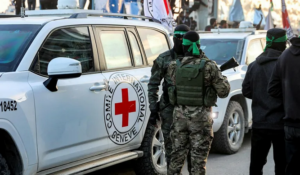It isn’t too late: The Israel-Hamas deal must be amended before it self-implodes

Hamas militants stand by vehicles of the International Committee of the Red Cross (ICRC) in Saraya Square in western Gaza City on 19 January 2025
Zvi Bar’el writes in Haaretz on 23 January 2025:
Six crazy, maddening weeks lie ahead of us. During each of these weeks we will be riding the terrifying roller-coaster known as “The Hostage Deal,” in which joy and sorrow, mourning and celebration will be swirling together along with tension and terror.
Throughout, piercing questions will continue to nag and terrorize: Will the hostages be released on Saturday or Sunday? Is the delay merely a technical glitch or a major violation? Will the process stop after 42 days, or perhaps sooner? Will we return to war or are we on the way to Phase 3, signaling the beginning of the reconstruction of the Gaza Strip?
And again each week we will watch Hamas’ white pick-up trucks driving in a victory parade alongside the grim faces of the hostages and later on of coffins. And again armed men will waive their weapons in the air to show the world they are still here while on the other side of the border, the hostages will be lovingly embraced by their families, and taken in by doctors and nurses for care. Everyone will be begging that all the hostages be returned – “now.”
But now is an obscene word in the prime minister’s lexicon. “That’s not how you conduct negotiations,” the head of the Mossad said in February. “You have to be tough.”
The result is a torturous, merciless agreement filled with land mines just waiting to explode. It’s an agreement that fails to achieve its main goal, which is not the return of the hostages, God forbid, but rather keeping the coalition in power.
This agreement must be amended before the self-detonating mechanism that’s implanted inside suddenly tears it apart, leaving the rest of the hostages for dead. It is not too late to amend it. There is no need to reinvent the wheel, the formula is well-known and familiar: “All for all and an end to the war” now, not in installments or in stages. After all, in the end, the existing agreement is supposed to lead to the same result anyway.
If phase two is completed successfully, the Israel Defense Forces will withdraw from the entire Gaza Strip (apart from a buffer zone on the border with Israel), including the Philadelphi corridor and the Rafah crossing; the cease-fire will become permanent, in other words, the war will end; all the hostages will be returned; and all the Palestinian prisoners that Hamas wants freed, will be freed.
The main difference between the drawn-out process and an immediate one is that the period of anxiety and trepidation will be reduced and the explosive devices that threaten the agreement’s full implementation will be neutralized.
Moreover, as the implementation period grows and in light of the fact that Israel continues to reject transferring civilian control of Gaza to the Palestinian Authority, the likelihood increases that Hamas will take re-control, distributing aid, food, and medicine and restoring infrastructure.
In practice, Hamas is already overseeing the distribution of humanitarian aid. This can still be stopped based on an Egyptian proposal, which calls for the establishment of a civilian management committee under PA auspices and will be composed of public figures and technocrats agreed by all the sides.
Palestinian President Mahmoud Abbas rejected the proposal out of fear that it would lead to the division of Palestine between the Gaza Strip and the West Bank, and would undermine the status of the PA and the PLO as exclusively representing the Palestinian people.
But even here, a compromise plan that preserves the PA’s status as the ultimate authority before Hamas secures complete control over Gaza would be worked out. On the 16th day after the cease-fire agreement has gone into force, Israel, Hamas and the mediators are supposed to begin talks on implementing Phase 2.
But there is no need to wait for that date, which threatens to become a way out of the agreement. There is nothing stopping the sides from moving the negotiations forward to work out a compressed timetable that releases the hostages immediately and lays the foundation for civilian rule in Gaza.
We should not wait another month and a half to be saddled with the same familiar whining about a missed opportunity, like those that were squandered in May, August, and November.
This article is reproduced in its entirety
